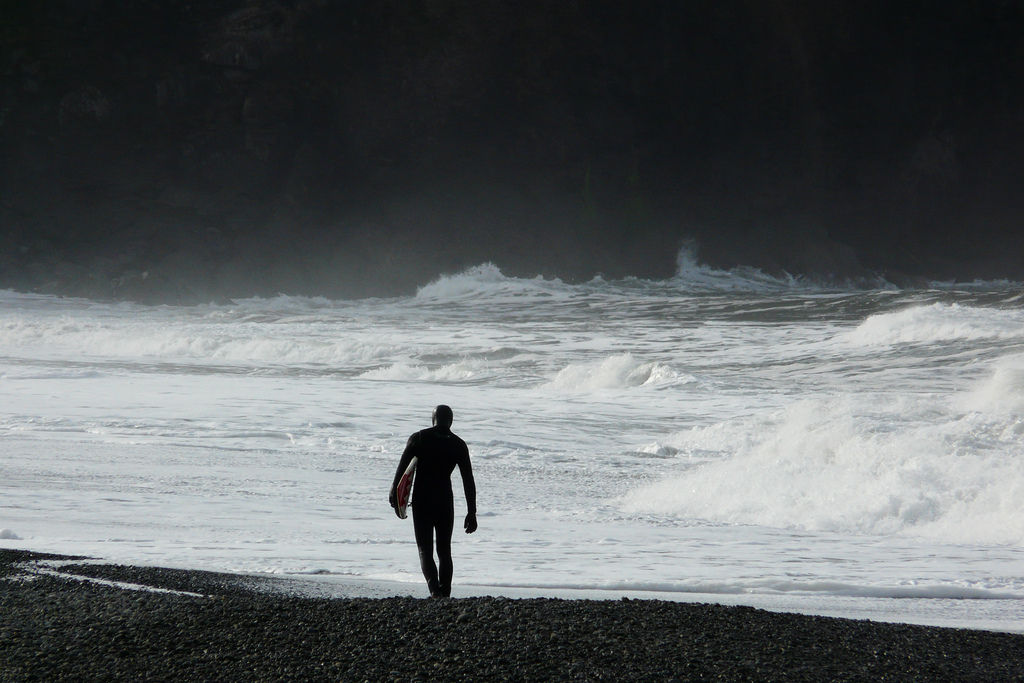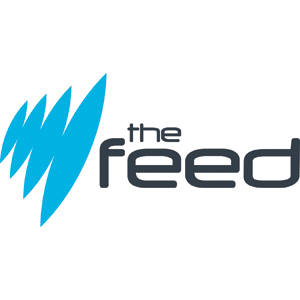Is Homosexuality Still Taboo In Surfing?
Surfing can provide an almost spiritual experience, but its hyper-masculine culture doesn't leave much space for outsiders.


Brought to you by
This week, The Feed on SBS 2 is homing in on taboos. From housewife escorts to gay surfers, fat activists to child-free-by-choicers, prepare to be challenged, confronted — and maybe even a little weirded out — by the stories that others aren’t brave enough to touch. We’ve partnered up with them to bring you this piece; for the full story, tune into SBS 2 from 7.30pm tonight, or watch the preview here.
–
Surfing is a lot more than an athletic pursuit. To the converted, surfing is a religion, a communion with nature that requires the ability to listen to the ocean, respond to its rhythms, and respect its power. It’s spiritual, peaceful, meditative and enlightening.
But nature is rarely just calm: it can also be violent and forceful. In moments of high adrenalin or stress — like when you’re entering the barrel of a wave, at risk of being dumped under a surge of tidal energy — deeper prejudices are revealed. The indigenous football player on the opposing team is a ‘monkey’. The female driver who accidentally cuts you off in traffic is a ‘stupid bitch’. The man (gay or not) who pulls back on the wave you wanted to go for is a ‘faggot’.
Gay people exist in all walks of life and across a variety of industries. Our society has come to terms with that. But there are some fields, including surfing, where hyper-masculine rhetoric is so dominant that the mere existence of gay people is barely acknowledged.
One surfer realised this, and created a global community for them to come together.
–
(Wipe)Out of the Closet
Thomas Castets, 37, is a French-born Australian resident who has surfed since his teens. Like many die-hard surfers, the sport informed his decision to move to Australia. He founded the online community GaySurfers.net, a space for ‘surfers who happen to be gay’. It’s a familiar distinction that many gay surfers make: their surfer identity takes precedent over their sexuality.
That love of surfing means that gay surfers generally try not to stand out. “Everyone tries to blend in,” says Castets. “There is a hierarchy in the water over who takes the wave, and you want to fit in so you can take the next wave. It’s like a little army. We want to be out there in the environment, and not attract too much attention.”
Despite this, or perhaps because of it, Castets has produced a new documentary, Out in the Lineup, in which he and gay ex-pro surfer David Wakefield speak to both closeted surfers and flamboyantly queer ones, as well as members of the straight surfing community.
What Thomas discovered was that surfing is still perceived as a boys club. Despite their talents, female pro surfers compete for far less prize money than their male counterparts and are still reduced to bikini models by their own sponsors — in some campaigns, they are rendered headless, just tits on a surfboard. Lesbian pro surfers, of which there are several, must conform to this standard of beauty or forego the sponsorship deals that make pro surfing financially worthwhile. Gay male pro surfers are invisible, too concerned that their hyper-masculine sponsors would drop them.
Thomas believes invisibility is just as damaging as aggressive homophobia. “Most straight people have never thought about the issue. I think that they’re over [the issue of] gay visibility — they don’t understand why we want to mention the subject. So we have to explain: there are still suicides. Also, most straight surfers don’t know any gay surfers, so they think it’s okay to call people gay for pulling out of a wave.”
Like footballers, revheads or investment bankers, the surfers who display the most skill, daring and machismo tend to rise to the top. All of these male-dominated fields are fertile breeding grounds for bullying, sexism, and homophobia. Thomas, who grew up in France, has never personally experienced homophobia in the surf, but he’s witnessed it often, in many forms.
“I didn’t grow up here, through the Australian structure of masculinity. Being French, I’m already different. They let me be gay, and don’t hold it against me. But if I was local it would be different. I see people get shut down all the time. I see the kid that is being encouraged not to take a wave, kept outside the group. They’re excluded. There are a number of people on GaySurfers who surfed as kids, but dropped it because they weren’t encouraged.”
Out In The Lineup has gone around the world in the US and Europe, and has won a number of awards, including Best Documentary at Sydney Mardi Gras Film festival. But not all gay surfers are on board with the film. Adam George, 29, has grown up in the surf. An aspiring singer and self-confessed water baby, he was taught to surf by his father and has lived by the beach his entire life. Like Thomas, Adam has never felt particularly targeted for his sexuality. He looks and sounds like a typical Australian surfer, i.e. straight — but that doesn’t mean he hasn’t heard homophobic language used in the surf.
“It’s probably not the healthiest attitude to have, but I’m just a bit numb to [the word ‘faggot’]. I’ve grown up around these guys using that word as a derogatory term. I just don’t think I thought they were calling me gay.” Although Adam concedes words like “faggot” reinforce the perception of gay men as weak, he also takes the view that surf culture is in no rush to change its ways.
“You probably will hear ‘faggot’ out there, but that’s not going to change any time soon.” And when he heard about the Castet’s gay surfers group and the documentary, Adam had concerns.
“I don’t know what they’re trying to achieve or how successful it will be. Everyone’s different. With a lot of gay culture it’s, ‘We’re the same, we want to same rights,’ but we go about it by forming another sub-group ourselves. It’s playing it safe. More gay guys [should] take the stand and say, ‘Well if I want to fucking surf, I’ll fucking surf. I don’t need a group.’”
Both Thomas and Adam are obviously passionate about access for everyone to the world of surfing, but differ greatly in their perception of how important visibility is to reduce stigma around being gay. For gay surfers, the lack of belonging to either the straight surfing or the traditional gay subcultures can mean stigma, both felt and perceived, from both communities.
–
Get To The Point (Break)
Other male-dominated fields like football and the military have bowed to political and market pressures to be more inclusive (even if at a glacial pace). Why, then, is surfing taking so long to join the party? In his recent book The End of the Homosexual, Australian queer theory elder Dennis Altman points out that it’s become more difficult to be openly homophobic. “This does not mean deeper hostilities have disappeared, only that it has become less acceptable to express them,” Altman writes. The sheer lack of out gay surfers suggests that in being absent, a space is created in which homophobic language and stigma continues to be encouraged.
Surfing may be a communion with nature or religious experience, but spiritual enlightenment means little if it is only available to you and your kind. As Thomas points out: “As soon as you jump in the water you leave your sexuality on land, no more barriers…our job is to show people how to be inclusive. We love surfing so much that we should be proud of our surfing culture, and make it a better place.”
–
Tonight on The Feed on SBS2, producer Gabriel Virata explores the Taboo of gay surfers.
The Feed screens at 7.30pm, Monday-Thursday on SBS 2, and this week is Taboo Week.
